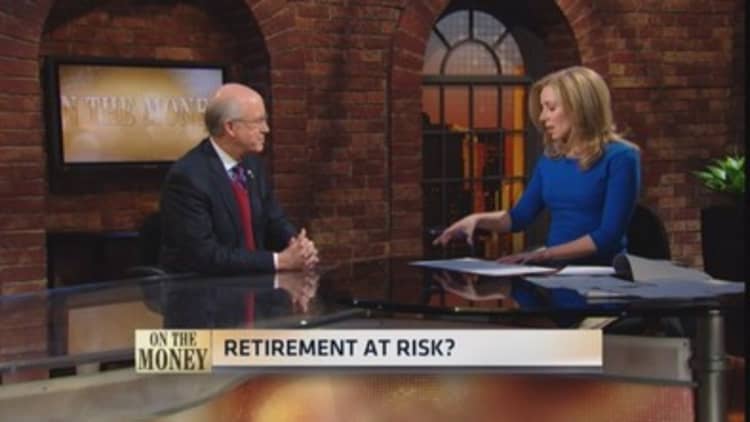
According to a former top government official, your retirement could be at risk, and the escalating costs of Social Security, public pensions and health care are the primary reasons why.
The Social Security Administration itself confirms as much, recently warning that part of Social Security—the Disability Insurance Trust Fund—could run out of money as early as next year. That could leave the nearly 11 million people who depend on disability payments without necessary funds.
David Walker, the former Comptroller of the United States, echoed those concerns in an interview with CNBC's "On the Money" recently. "According to the trustees, it's supposed to go to zero, the so-called trust fund in 2016," he said. From 1998 to 2008, Walker served as Comptroller General of the United States, and head of the Government Accountability Office.
In an interview, Walker predicts that Congress, as a temporary fix, will probably reallocate payroll revenues from the retirement portion to the disability portion. However, he argues that won't solve the problem.
Read MoreBoomerang kids ruin their parents' retirement
"Washington has a tendency to put band aids on open wounds, rather than trying to actually do what needs to be done," he added.
No 'trust' in government trust fund?
Signed into law by President Franklin Delano Roosevelt in 1935, Social Security system has provided a safety net for American workers. In 2013, Social Security provided benefits to 58 million, which include 41 million retirees and dependents, six million survivors of deceased workers and 11 million disabled workers and their dependents.
Yet a number of critics say the safety net stalwart is teetering on the verge of bankruptcy. Walker says the federal government "uses words that don't mean the same thing as Webster's Dictionary."
Citing the term "trust fund" as an example, the former official said "You can't trust it, it's not funded. What's in the trust fund is government debt." Yet Walker says in reality, there's enough government debt to pay timely Social Security benefits until 2033.
Walker offered three solutions to "gradually phase in" to fix Social Security. He calls for something that has become the third rail of politics: increasing the retirement age for younger workers, based on increases in life expectancy. He also suggests changing the benefit formula to provide more money for lower income retirees, but less for higher income individuals.
Read MoreWant a fat nest egg? Make the right social security choices
He also believes part of an eventual Social Security solution will be to raise the payroll tax cap from the current $118,500 to about $200,000. However, Walker opposes raising the tax rate above the current 6.2 percent for both employers and employees, calling that "regressive."
Another looming threat to retirement, is underfunded state pensions and the healthcare they provide to retirees. Walker says state and local governments made very generous promises to their retirees.
According to Wilshire Associates, U.S. state pension plans were 80 percent funded in 2014.That's down significantly from peak of 95 percent in 2007, just before the financial crisis walloped the global economy.
Walker offered three solutions to fixing the state pensions funds. He calls for creating new plans for new workers and eliminate the abuses, including "double-dipping." Additionally, Walker suggested putting a cap on indexing benefits to rise with inflation.
Walker has more bad news on health care. "Medicare is in much worse shape than Social Security," he said, adding that the government "overpromised" on its health benefit obligations.
The Affordable Care Act promised too much, he says, and "didn't do enough with regard to controlling health care costs." Still, the Congressional Budget Office said this week that slowing health care costs were pushing down the price tag for Obamacare.
Walker, however, calls health care inflation the "biggest single challenge the government faces." The reason, he says, is known demographic trends, which are outpacing both inflation and economic growth.
The former Comptroller General blames the "great partisan and ideological divide" for the lack of progress on the issue. He says Democrats don't want to talk about Social Security or Medicare reform preferring to "wait until we're at the cliff's edge." Republicans, meanwhile, don't want to consider raising the taxable wage cap, because they call it a tax increase.
"They need to understand the longer we wait, the more dramatic the changes, both on the spending side and the revenue side," Walker said, warning that time was of the essence.
"Making tough choices sooner rather than later is the way to go," he said.
On the Money airs on CNBC Sundays at 7:30 pm, or check listings for airtimes in local markets.



